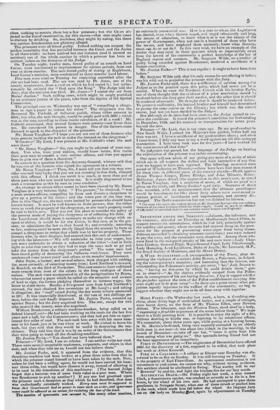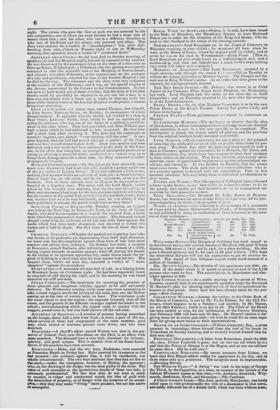MORE FIRES.— On Wednesday last week, a barn, a thrashing-ma-
chine, about thirty bags of unthrashed barley, and a couple of cottages, were burnt down, on the farm of Mr. Thomas Elliot, near Newton Abbott. The labourers, says the Western Times, stood aloof in a body, "expressing a fiend-like enjoyment of the scene before them." We hope there is a' little painting here. It is possible to enjoy the sight of a fire,. without desiring to kindle one, or rejoicing in its calamitous effects. We remember, about three years ago, while gazing at a burning house,' in St. Martin's-he-Grand, being very urgently entreated by an elderly little man in our rear—it was about two o'clock in the morning, in the month of December—to take off our hat, "'cause it quite kept him • from seeing what was going on." Our spectacle-loving friend had not the least appearance of an incendiary. FIRES IN DEVONSHIRE.—The magistrates of Devonshire have offered 500/, for the discovery of a fire, supposed to be wilful, that took place last week at Abbot Kerswell.
FIRE IN A COLLIERY.—A colliery at Elsecar near Barnsley was dis- covered to be on fire on Sunday. It was still burning on Tuesday. It is the property of Earl Fitzwilliam. As spontaneous combustion is not uncommon in coal-mines, we cannot see why, without strong evidence, this accident should be attributed to Swing. That worthy will be our • "Brownie" by-and-by, and light the kitchen-fire for our lazy maids. • ACCIDENTAL Dasurst.—On Friday night last week, a man named Clark, a Somerstown carrier, was crushed so severely as to die in a few hours, by the wheel of his own cart. He had attempted to pass three gentlemen in Newgate Street, when one of them struck or pushed him - in the neck, which made him fall below the wheel. An Inquest Jury • sat on the body on MondayMand. again by adjournment on Tuesday
night. The person who gave the blow or push was not arrested by his two companions, one of whom ran away because he had a large sum of money about him ' • and the other, who ran in a different direction to take care of his friend and his money, was pursued and taken. The Jury were anxious for a verdict of " manslaughter ;" but, after deli- berating from nine o'clock on Tuesday night to one on Wednesday morning, they agreed to return a verdict of " accidental death."
APOPLEXY FROM COLD.—An old man died on Sunday morning, of apoplexy (so said the Hospital pupil), induced by exposure to the weather.
lie was discovered by the passengers lying on the steps of a door-way in Osborne Street, Whitechapel : a Policeman who was passing was urgently entreated to take the miserable man to the Hospital, or Station-house, and refused ; two other Policemen, at the expense and on the entreaty of a lady and gentleman, removed the man to the London Hospital ; but he died by the way. The witnesses and the Jury were very indignant at the conduct of the Policeman ; and it was, on the special request of the Jurors, represented by the Coroner to the Commissioners. It does not seem to have struck any of these worthies, that the duty of Christian charity could by possibility be imperative on any one but a man in a blue coat and armed with a baton and a rattle, or that any walls but those of the Station-house or the London Hospital would protect a human being from starvation.
LOVE AND S U IcIDE.—A young man, named Thomas, shot himself, in John Street, Liztnway Street, on Monday, in consequence of a love
disappointment. It appeared that the foolish lad worked in a shop in Bear Street, Leicester Fields, from which he had an opportunity of ogling his mistress, who was one of the ladies of a milliners establish- ment in the same street. They had quarrelled, and Miss Milliner sent
back a-letter which he had addressed to her, unopened. He shot him- self a; short time after receiving it. The facts and the arguments at
coroners' inquests, are, though " ever varying, still the same." A sur- geon deposed, that the ball had passed through a portion of 11w lungs, and must have caused almost instant death. After this opinion had been
delivered, and a few words had been addressed to the Jury by the Coro- ner, to the effect that sometimes an unrequited attachment produced so strong an effect upon youthful Minds., constituted in a certnin way, as to bring about derangement for a short time, the Jury returned a verdict
of temporary ty.
HUMANE Co NSIDERAT ION—On Sunday night, four miserable crea- tures were discovered, half dead with cold, huddled together under one
of the dry arches of London Bridge. They had collected a little straw,
and had piled up some bricks on each side of their gile, as breakweathers. One of them was an old sailor, and he lay outermost, as he was the
hardiest. Two of these outcasts were so ill as to he conveyed to the hospital in a hopeless state. The sailer told the Lord Mayor, before whom he was brought next morning, that the two men (according to their own statement) had slept for the two previous nights in a lodging; but the overseer of the parish . had prevailed on the landlord to turn them out, because they were in very bad health, and, he was afraid, if they were permitted to remain, the parish would have to bury them !
SINGULAR CAUSE or DEATII.—On Tuesday eveniog, an inquest was held at the Turf Tap, in Tattersall's Yard, on the body of Emma
Smith, who died in consequence of a wound she received from a knife with which her grandmother was buttering toast. The deceased turned sharply round from the table and struck her arm with force against the knife, which had been lately sharpened, and received a wound two inches and a" half in depth. She died from the loss of blood that en- sued.
CRIMINAL NEGLECT.—Whether the medical art is getting into infe- rior hands, or its professors are degenerating from their high character,
we know not, but the complaints against them have of late been more common and serious than ordinary. On Sunday, last week, a surgeon at Doncaster, named Raeburn, after delivering a poor woman of a child, having urgent business in another quarter, went off, leaving the female to the charge of an ignorant apprentice boy, under whose heads she ex- pired of flooding in a short time after his busy master had left her. The Inquest Jury, which sat next day, returned a verdict of " man- slaughter " against the accoucheur.
STARVAT I 0 N.—A miserable old man died of cold, in a lodging-house in Rosemary Lane, on Christmas night. He had been repeatedly heard to complain of cold during the night, and in the morning he was found stretched out stiff and dead.
STEAM CARRIAGES.—The machinery for arresting the progress of these pleasant and dangerous vehicles, appears to be still extremely
deficient. On Wednesday evening, while some men were attempting to take a stone waggon across the Liverpool rail-road, they saw the Meteor coming on at the rate of twenty miles an hour. The watchman made the usual signal to stop the engine ; the engineer instantly shut off the steam, and the guards of the different carriages applied the breaks to the wheels ; notwithstanding which, the engine came in contact with the waggon, passed over it, and was itself thrown off the rail-road.
ACCIDENT IN SSAITING.—A number of persons having assembled at the Lough, about half a mile from Cork, to skait, a part of the ice, where several of them had congregated at the same moment, gave way, when twelve or fourteen persons went down, and two were drowned.
Poacntas.—A sheriff's officer named Weston was shot in the pre- serves of Colonel Peel, near Downham, on the 23rd, in an affray with some poachers. The deceased bore a very high character for honesty, sobriety, and good temper. This is another fruit of the Game-Laws. Seven of the poachers have been arrested.
-EXECUTION.—Dyke, and the two boys, Packmans, were executed at Peaenden Heath on Friday last. Dyke asserted his innocence to the'
last moment : the evidence against him, it will be recollected, was wholly circumstantial. The two boys admitted that they had set fire to the stack,—under the instigation, however, of Bishop, the approver; who, on the showing of the Judge, was the most guilty of the three. The value of such examples as the ignominious deaths of these two lads, is
extremely problematical We tear that they do not tend so- much to connect, in vulgar and uneducated minds, the idea a guilt with the destruction of property, as of danger with the presence of an accom- plice,---that they may make "Swing" more prudent, but not less active or revengeful.































 Previous page
Previous page